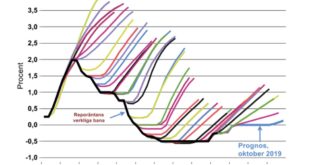Debunking the barter myth .[embedded content] Even in the most advanced industrial economies, if we strip exchange down to its barest essentials and peel off the obscuring layer of money, we find that trade between individuals and nations largely boils down to barter. Paul Samuelson You will find similar nonsense stories told in almost all mainstream textbooks today. And the truth, as so often when it comes to economics fairytales, is quite another: No...
Read More »More ´Natural rate of unemployment´ busting, bad measurement edition.
The ´natural rate of unemployment´, also called ´Non-Accelerating Inflation Rate of Unemployment´ (NAIRU) or ´Non-Accelerating Wage Rate of Unemployment´ (NAWRU), is as, on this blog, Lars Syll states (here and here), a dangerous tool. According to NAIRU/NAWRU theory, a) When unemployment falls below a certain threshold, an inexorable increase in inflation will start. This is simply not true, considering the facts. b) As NAIRU/NAWRU theory is untrue, it can´t be measured by...
Read More »Money for beginners
Economists have sometimes misled us with their belief that it is their job to tell “white lies” to scare the population into “behaving themselves.” We think that is the wrong approach. This book trusts you, the reader, with that truth. We trust you to do what you can to spread the truth and to hold policymakers accountable. The truth is that government faces political constraints. It faces resource constraints. It faces technological constraints. But it does not, cannot, face...
Read More »Busting the ‘natural rate of unemployment’ myth
from Lars Syll Sixty years ago Milton Friedman wrote an (in)famous article arguing that (1) the natural rate of unemployment was independent of monetary policy and that (2) trying to keep the unemployment rate below the natural rate would only give rise to higher and higher inflation. The hypothesis has always been controversial, and much theoretical and empirical work has questioned the real-world relevance of the idea that unemployment really is independent of monetary policy and that...
Read More »The Deficit Myth: The Biggest Lie In Politics
The Deficit Myth: The Biggest Lie In Politics .[embedded content] In modern times legal currencies are totally based on fiat. Currencies no longer have intrinsic value (such as gold and silver). What gives them value is basically the simple fact that you have to pay your taxes with them. That also enables governments to run a kind of monopoly business where they never can run out of money. A fortiori, spending becomes the prime mover, and taxing and...
Read More »Riksbankens oansvariga penningpolitik
.[embedded content] Riksbanken har en nästintill oinskränkt makt över penningpolitiken, en politik som i hög grad styr inflation, sysselsättning och ekonomisk stabilitet. Denna makt bör vara föremål för större demokratisk övervakning för att säkerställa att den överensstämmer med vad vi som samhällsmedborgare har för intressen. När man diskuterat Riksbankens oberoende har man oftast definierat detta i förhållande till regeringar och intressegrupper. Men hur är det med...
Read More »Debunking the ‘natural rate of interest’ myth
Debunking the ‘natural rate of interest’ myth Keynes’s signal contribution was to switch the emphasis from interest rate adjustments to changes in income as the key macroeconomic adjustment mechanism. In so doing, he argued that the interest rate and asset prices adjust to clear balance sheets incorporating stocks, not flows, of financial claims. He pioneered national income accounting which now reveals the importance of leakages due to business saving,...
Read More »The political economy of estimating productivity.
Who decides what statistical offices measure and how they measure it? And what are the implicit values embedded in these decisions? Recently, the ILO issued a new manual on measuring productivity. Below, I´ll discuss the questions posed. But for starters, it is essential to realize that economists measure monetary productivity, not physical productivity, which leads to problems with ever-changing prices. This will be part of the discussion. The ILO (International Labour Organization)...
Read More »The 2 per cent central bank fetich
The 2 per cent central bank fetich The 1990s had witnessed the widespread adoption of official inflation targets by central banks … Not only did the major central banks in the developed world now have a target, but they all coalesced around the same number: 2 per cent acquired talismanic significanc … After 2008, central bankers’ pursuit of inflation targets became as obsessive as their fear of deflation. “The ultimate and the only mandate that we have to...
Read More »Reconsidering Central Bank Independence
Reconsidering Central Bank Independence For anyone naive enough to believe that Central Bank governors’ work is based on solid evidence-based science — forget it! What the newly broadcasted Swedish documentary Debt Fever convincingly demonstrates is that the work of Central Bank governors is little more than subtle storytelling charlatanry—and they know it themselves! In the documentary, Financial Times journalist Gillian Tett describes the work of central...
Read More » Heterodox
Heterodox








